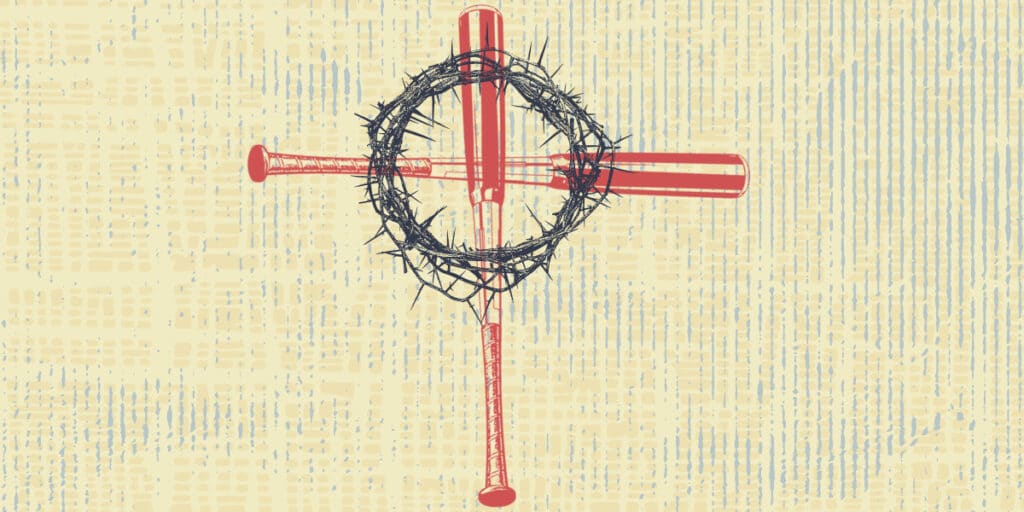This author offers us practical ways to make the best of the 40 days of Lent.
Those who follow baseball know that spring training has begun. In Florida, Arizona, and California, the best baseball players in the country are preparing for the forthcoming season. They come to their respective training camps with one goal in mind—to play in the World Series.
Baseball players must prepare themselves for the season in three ways. First, they need to get in shape. Running, exercising, dieting—all may be necessary to drop weight and gain stamina for the long season ahead. A player who is in good shape stands a much better chance of helping his team reach the World Series. A player needs to practice the fundamentals of the game. Constant work in the batting cage will hone the offensive skills needed to score runs.
Endless hours in the field shagging flies and fielding ground balls will develop the defensive skills needed to win. Lastly, good baseball players must develop a positive mental attitude to succeed. Baseball is a game in which individuals can shine, but it is the team that wins or loses. A winning team must have a winning attitude.
The season of Lent is the Church’s “spring training” in the faith, an annual period of preparation for the celebration of Easter. Our preparation, as in baseball, involves some challenges along the way.
The Scripture Challenge: Return to God
The first set of challenges are appropriately found in Scripture. On Ash Wednesday, we hear Joel (2:13a) proclaim, “Rend your hearts, not your garments, and return to the Lord, your God.” Yes, the basic challenge from the Scriptures is to return home to God. Too often, we drift away from God. Thus, Joel’s warning is an important reminder as we begin this sacred 40 days of preparation. An additional challenge is presented by St. Paul (2 Cor 5:20b): “We implore you on behalf of Christ, be reconciled to God.”
The apostle to the gentiles knew from his own experience the need for reconciliation and thus reminds the faithful in Corinth of their same need. Lastly, Jesus challenges us to consider our need to fast, pray, and give alms (Mt 6:1–6, 16–18). The words of Joel, St. Paul, and Jesus remain as relevant today as when they were first proclaimed.
The Gospels proclaimed during Cycle A of the liturgical year (often used each year in parishes with Rite of Christian Initiation of Adults programs) provide a series of challenges for all as we prepare for our return home. We hear how Jesus was tempted by Satan (Mt 4:1–11) with power, wealth, and prestige. We go to Mount Tabor, witness Jesus’ external transfiguration (Mt 17:1–9), and ask what type of personal interior transformation we need.
Jesus’ conversation with the Samaritan woman (Jn 4:5–42) forces us to ask: Are we drinking the waters of secularism or those of wisdom and grace provided by Christ? The Lord’s encounter with the man born blind (Jn 9:1–41) prompts us to contemplate: How blind are we to many of the situations around us? Are we too caught up in our own little worlds? Is our perspective far too myopic?
When Jesus raises Lazarus from the dead he tells the crowd, “Untie him and let him go” (Jn 11:44c). How are we chained to the past—injuries inflicted or received, failures, disappointments? Jesus can free us if we allow him to act. On Palm Sunday, we read the passion, forcing us to ask how we have added to Jesus’ burden as he walks bravely to Golgotha and the cross. What can we do as ministers to lighten the burden of others?
The Society Challenge: Staying True to Our Beliefs
The next challenge we face comes from society. What does the expression, “We are to live in the world, but not of the world” mean? Contemporary society provides a framework for our day-to-day lives. We must abide by the basic law of the land; we live in a democratic and capitalistic nation and, thus, must follow the basic framework that exists. The challenge is to live within this structure but not buy into ideas that are contradictory to Jesus’ message and the precepts of the Church.

Many today suggest that there is an ongoing “war against Christianity.” Having met the test of time, various Church principles are being challenged and/or discarded as passé or no longer applicable. This “war” has been driven by a pervasive drive to secularize society. God and organized religion have been placed on hold or in many cases discarded as no longer relevant or useful.
Lenten Challenges for Priests and Religious
A third Lenten challenge is specific to religious and especially the ordained. This holy season provides an opportunity to challenge ourselves in important ways. How do we utilize our time? Do we find ourselves wasting too much time, especially on things that are rather frivolous and not productive to our ministry? Do we spend time engaged in activities that are detrimental to ourselves and others? On the other hand, if we are not careful, ministry can become all-consuming, leading us to forget that we are human and need time for ourselves.
As a car cannot continue to run unless it is periodically “gassed up,” so, too, we must regularly refuel ourselves so that we can continue to minister well to the faithful. Overwork and burnout, especially with the reality of fewer religious and priests and an increasing need for our presence and services, lurk around the corner. Therefore, it is essential, and a significant challenge, to step back occasionally and reenergize. The Lenten themes of reconciliation and coming home provide the perfect opportunity.
Creative Ways to Pray, Fast, and Give Alms
The three specific challenges offered above, namely Scripture, society, and our roles as priests and religious, must be addressed if our Lenten journeys are indeed to be profitable for ourselves and those we serve. Meeting the challenges of Jesus proclaimed in his Sermon on the Mount—to pray, fast, and give alms—can be done traditionally, but there are more creative ways as well. Prayer seems so basic to our lives as religious and priests, but we must all admit that, at times, we get away from what is foundational to our lives as Christians, and even more so for those who have chosen consecrated life and/or priesthood.
When was the last time we read and reflected upon a whole book in the Bible, possibly a Gospel or one of the Pauline letters? Spiritual reading should be an integral element of our daily prayer lives, but possibly during Lent the emphasis should be greater. We all know our faults and failures in prayer and thus we know what we need to do. We must take the time and do what is necessary to fill the gaps in our spiritual lives.
Spiritual direction is another essential element of our prayer lives. Do we avail ourselves of this most important opportunity for growth? If we have a director, does this person help us to grow so that we do not become stale or stagnant in our spiritual lives? If we do not have a director, we need to ask for guidance to find an individual who can feed us internally. Without this input, we will be much less effective as ministers to God’s people.

Fasting can and must be much more than simply refraining from certain foods. While there certainly is merit in eating less, both from personal health and spiritual perspectives, we should ask why we are engaging in this activity. Fasting must be more broad-based, however, than simply food and drink. Can we, for example, abstain from activities that are unproductive at best and unhealthful at worst?
While most priests and religious do not have the material resources to participate in almsgiving in a traditional way, nonetheless we possess several gifts to share. Possibly the greatest commodity we have is our time. Yes, we do need to be mindful of our own needs and guard against burnout in ministry, but that does not mean we cannot or should not aid others.
People usually need only five minutes of our time, and they don’t necessarily expect an answer, but simply an ear to listen. Our ability to serve is another way we can give alms. How can we use our personal talents or our communities’ resources to assist others? Can we share the material resources we have, meager though they be in some cases, with others who have even less?
Live the Change We Seek
We all must meet the challenge of society. First, we need to acknowledge the reality of the situation of the contemporary world. We cannot bury our heads in the sand like the proverbial ostrich and hope that the problems we face will magically go away and the pristine Christian message will once again be not only accepted but honored. Once we acknowledge the reality of our society, we must do what we can to live the ideal we seek to the best of our abilities.
What can we do to enhance the communities in which we live? Are we active participants or simply docile members who expect others to “fix” what is broken? We cannot and need not find remedies for situations that are beyond our scope, but an adage applies to our actions: “Think globally, but act locally.” In other words, we should have a broad perspective, but we need to work on the local level to build the kingdom of God.
Meeting the challenges of religious life and priesthood can be a tall order, but we must not shirk this most important responsibility. There is little that we can do individually to transform the contemporary environment of suspicion, the cloud that darkens our ministries, except to conduct our work to the best of our abilities. Restoring confidence will take time, but we must do our part. We can and must be generous with our time in the service of others, with the proviso that we need not save the world. Fortunately, Christ did that once for all time.
A Goal Worth the Effort
Like spring training in baseball, the season of Lent requires significant sacrifice and preparation. As athletes must hone their physical skills to compete well, so Christians—especially priests and religious—need to get into better “spiritual shape” to properly celebrate the Easter Triduum.
Let us, therefore, take up the challenge of Scripture, society, and our own religious and priestly lives, and do what we can to make ourselves better prepared to go home to the Lord. Let us realize that the goal we set—not to be in the World Series, but namely to be with the Lord—is worth every ounce of our efforts.

Lent Lent Lent Lent Lent Lent Lent Lent Lent Lent Lent Lent

